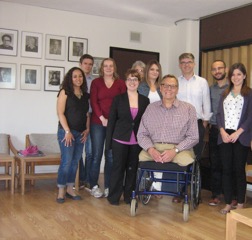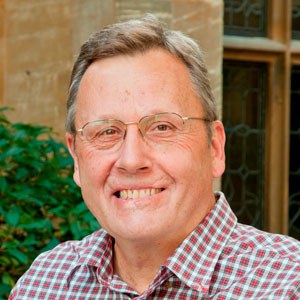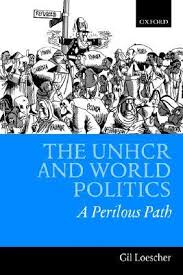by William Tait
(First published by Carleton University FASS blog)
On September 23-25, Migration and Diaspora Studies held the three-day workshop “Power and Influence in the Global Refugee Regime” organized by Dr. James Milner from Carleton’s Department of Political Science. The event brought together scholars and practitioners from academia, NGOs and government to discuss how refugee policy is influenced and implemented by a broad range of actors, from grassroots activists to transnational governments. One of the presenters was Dr. Gil Loescher from the Refugee Studies Centre at Oxford University. Gil kindly agreed to hold a separate master class for graduate students before the main workshop took place. The master class, hosted by Dr. Milner and Dr. Dominique Marshall from the Department of History had been organized around a discussion of Gil’s 2001 book, The UNHCR and World Politics: A Perilous Path, a definitive political history of the first five decades of the Office of the United Nations High Commissioner for Refugees. The class however, developed into something much more than a discussion of this book.
Gil began by outlining his longstanding collaboration and friendship with James on the study of forced migration and refugee policy. He explained how their intellectual collaboration and friendship developed from their first meeting in the graduate lecture rooms of Oxford and spanned years of research from the refugee camps on the Thai / Burma border to the offices of the UNHCR in Geneva. He then led us through both a personal and institutional history of how, in the course of thirty years, refugee studies developed from a handful of scholars to a subject that now draws interest from a broad range of disciplines to become the focus of scores of dedicated journals, conferences and monographs. This interdisciplinary interest was confirmed by the background of the graduate students who attended the class, from Political Science to Law, Journalism, History, Sociology and European, Russian and Eurasian Studies.

A true pioneer in this field, Gil described his own career and that of other scholars who started studies during the Cold War. They used grants from the Ford Foundation, in a context when refugee issues hinged on the political value in accepting asylum seekers from the Eastern Bloc, in the United States in particular. He conveyed how his experiences with refugees of the Cambodian genocide in the 1980s imprinted on him the significance of protracted refugee situations where individuals and families suffer in a limbo by being at once unable to return home and unable to follow their everyday ambitions in their host countries. Describing the 1990s as period where the UNHCR sought closer associations with NGOs, Gil also touched on how policy was created to address Internally Displaced Persons, and how his historical research on the UNHCR itself developed.
While exchanging with students about their own research projects, he gave practical advice based his approach to conducting archival and oral history interviews developed during conversations with many of the High Commissioners of the organization where diplomacy and critical analysis were central. While his critiques of the UNHCR caused initial antagonism among some in the UN, he stressed that over time the organization came to value them and incorporate some of them in constructive ways. In closing Gil reflected on some of the wider lessons he has learned during his long career as researcher, teacher and activist. One of these was that working towards lasting change takes patience and that it needs relationships based on trust and integrity. Another lesson was that individuals play a key role in how academic fields develop. As I walked out of the master class I thought about these lessons, especially in light of the political, economic and most importantly human costs of refugee policy. I also thought about how academics like Gil Loescher can make a difference. As a graduate student the mechanics and deadlines of completing a degree often overshadow why we really do what we do. Listening to Gil and his experiences in developing relationships to address questions of refugee issues provided clarity and inspiration in how to approach my own work.

Gil Loescher is Visiting Professor at the Refugee Studies Centre, University of Oxford. He is a long-established expert on international refugee policy. For over 25 years, he was Professor of International Relations at the University of Notre Dame in the United States and was a visiting fellow at Princeton University, LSE, Oxford and the Department of Humanitarian Affairs at the US State Department in Washington DC.
For more than 30 years, he has been a pioneer in the understanding the relationship between world politics and the causes, consequences and possible responses to forced migration, especially refugee movements. His innovation in the field has resulted in dozens of publications and laid the foundation for the future study of the role of domestic and international politics in historical and contemporary responses to refugees.
Will Tait is a History and Political Economy Ph.D candidate working under the supervision of Dr. Dominique Marshall, Carleton University. His main area of interest is transnational humanitarian history. Tait’s dissertation addresses the influences and connections between Canadian Faith Based Organizations and humanitarian NGOs in the context of the Cold War. His research intersects with refugees, forced migration studies and the role of NGOs in global regimes / global politics through specific examples in East Asia, East / West Africa and Latin America from 1946 to 1986. He is a founding member of the Canadian Network on Humanitarian History (aidhistory.ca).



